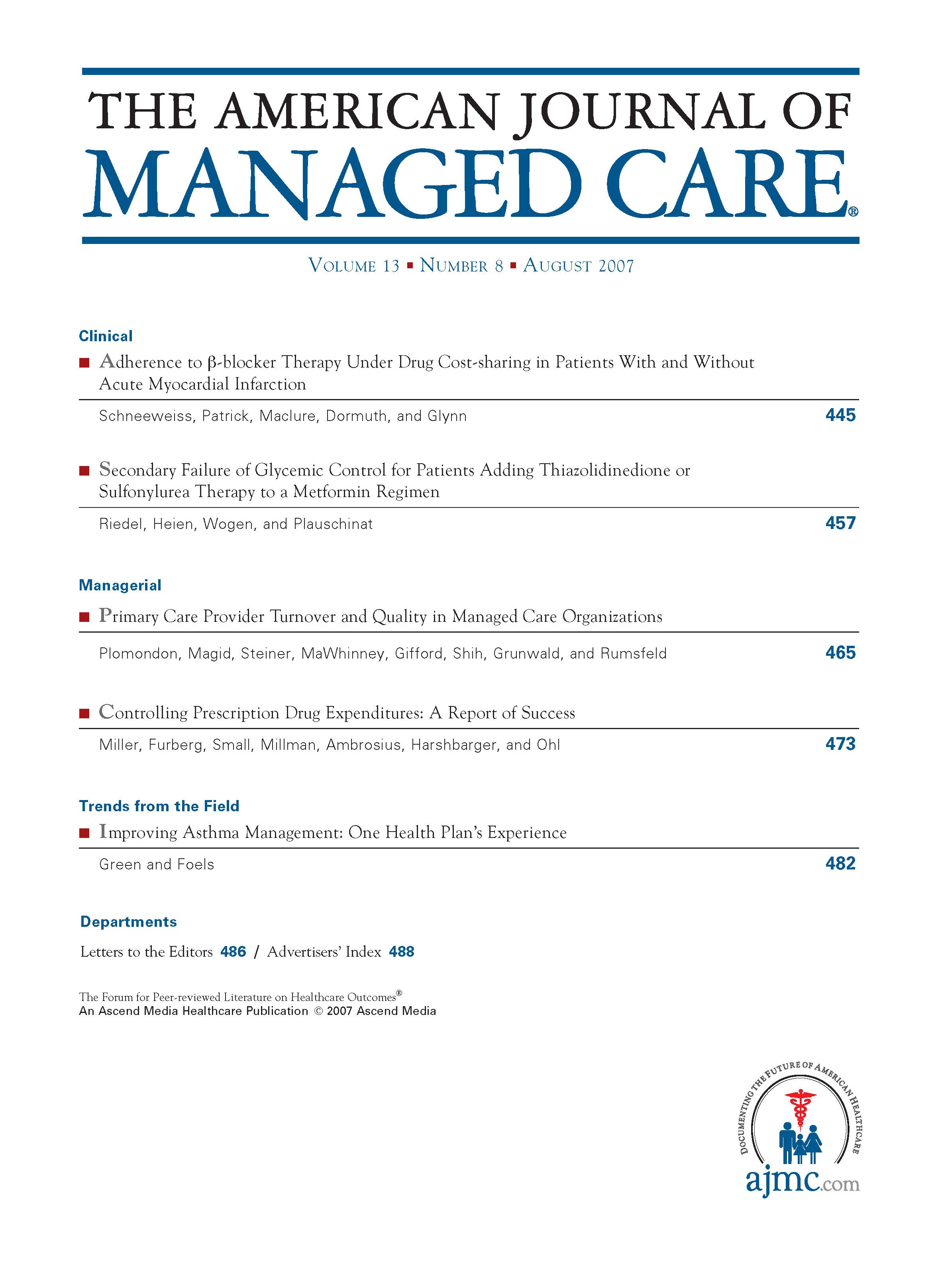- Center on Health Equity & Access
- Clinical
- Health Care Cost
- Health Care Delivery
- Insurance
- Policy
- Technology
- Value-Based Care
Patient Preference for Colorectal Cancer Screening
TO THE EDITORS:In the July issue of The American Journal of Managed Care, Schroy et al1 reported on preferences for colorectal cancer (CRC) screening tests in relation to currently recommended screening modalities (ie, fecal occult blood testing (FOBT), flexible sigmoidoscopy, colonoscopy, double contrast barium enema (DCBE), and stool DNA (sDNA) testing. Participant preferences were elicited in relation to information provided about different types of screening tests. Survey respondents represented a convenience sample of average-risk individuals between 50 and 75 years of age with no prior CRC screening. The authors found that colonoscopy was the most preferred CRC screening option, followed by noninvasive stool blood testing. Screening with flexible sigmoidoscopy and DCBE were less frequently preferred alternatives. The authors also reported that study participants preferred sDNA over FOBT.
As noted above, specific features of the different CRC screening tests were described to study participants to elicit preferences. Thus, the nature of these descriptions is a central factor that conditioned participant responses. The authors noted that information provided to the participants about the recommended CRC screening tests was “nearly identical†to that used in an earlier research project.2 However, information provided about sDNA in the current study was not used in the earlier project. In that study, details about the process used to develop a decision aid that described CRC screening tests were provided; text describing the screening tests was not available. That information would have helped the reader gain some insights into what test characteristics were featured in the descriptions and which of these characteristics might have accounted for the observed preference differences. This point is particularly relevant to the observation that participants tended to prefer sDNA over guaiac-based FOBT.
The authors acknowledge that they may have overstated sDNA accuracy in their description of that test. In addition, the description of FOBT offered to study participants was related to guaiac-based FOBT. Fecal immunochemical testing, a stool blood test to detect fecal hemoglobin, was not presented as an alternative. This omission is important as fecal immunochemical testing has removed many inconvenient and unpleasant aspects of guaiac-based FOBT and may be a more acceptable type of stool blood test. In one report, patients eligible for CRC screening were randomized to receive either a mailed guaiac-based FOBT kit or a fecal immunochemical test kit. Screening participation was significantly higher among patients who received the fecal immunochemical test as compared with those who received the guaiac-based FOBT.3 These data, along with findings reported in the current worthwhile study, suggest the need for more information on comparative preferences for guaiac-based FOBT, fecal immunochemical testing, and sDNA testing. Finally, there are substantial differences in cost to consumers for sDNA, fecal immunochemical testing, and guaiacbased FOBT. Test descriptions in comparison studies should include these differences in costs.
Ronald E. Myers, PhD
Department of Medical Oncology
Philadelphia, Pennsylvania
IN REPLY:
Professor
Section of Gastroenterology
Boston, Massachusetts
Author Disclosure: Dr Myers reports no conflicts of interest in regard to this article.
Authorship Information: Dr Myers takes responsibility for all aspects of the content and writing of this letter.
Address correspondence to: Ronald E. Myers, PhD, Professor, Department of Medical Oncology, Thomas Jefferson University, 1025 Walnut St, Ste 1014, Philadelphia, PA 19107. E-mail: ron.myers@mail.tju.edu.
Author Disclosure: Dr Schroy reports receiving grants from Exact Sciences, Inc, and AmberGen, Inc.
Authorship Information: Dr Schroy takes responsibility for all aspects of the content and writing of this letter.
Address correspondence to: Paul C. Schroy III, MD, MPH, Boston Medical Center, 85 E Concord St, Ste 7715, Boston, MA 02118. E-mail: paul.schroy@bmc.org.1. Schroy PC 3rd, Lal S, Glick JT, Robinson PA, Zamor P, Heeren TC. Patient preferences for colorectal cancer screening: How does stool DNA testing fare? Am J Manag Care. 2007;13:393-400.
3. Cole SR, Young GP, Esterman A, Cadd B, Morcom J. A randomized trial of the impact of new faecal haemoglobin test technologies on population participation in screening for colorectal cancer. J Med Screen. 2003;10:117-122.
5. Schroy PC 3rd, Lal SK, Wilson S, Heeren TC, Farraye FA. Deficiencies in knowledge and familial risk communication among colorectal adenoma patients. J Clin Gastroenterol. 2005;39:298-302.
7. Pignone M. Patient preferences for colon cancer screening: the role of out-of-pocket costs. Am J Manag Care. 2007;13:390-391.

Specialty and Operator Status Influence Electronic Health Record Use Variation
January 22nd 2026Operators demonstrated specialty-specific differences in electronic health record efficiency, timeliness, and after-hours use, highlighting how workflow and training shape documentation behaviors across medical disciplines.
Read More
Empowering Children and Parents Through Technology: Opportunities, Challenges, and Future Directions
January 15th 2026Digital health platforms improve pediatric care by offering customized, interactive tools for children and parents. They enhance education, support, and engagement while tackling challenges related to access, usability, and privacy.
Read More
Insights Into Patient Portal Engagement Leveraging Observational Electronic Health Data
January 12th 2026This analysis of more than 250,000 adults at least 50 years old with chronic conditions showed lower portal use among older, non–English-speaking, and Black patients, underscoring digital health equity gaps.
Read More
Subjective and Objective Impacts of Ambulatory AI Scribes
January 8th 2026Although the vast majority of physicians using an artificial intelligence (AI) scribe perceived a reduction in documentation time, those with the most actual time savings had higher relative baseline levels of documentation time.
Read More
Telehealth Intervention by Pharmacists Collaboratively Enhances Hypertension Management and Outcomes
January 7th 2026Patient interaction and enhanced support with clinical pharmacists significantly improved pass rates for a measure of controlling blood pressure compared with usual care.
Read More

